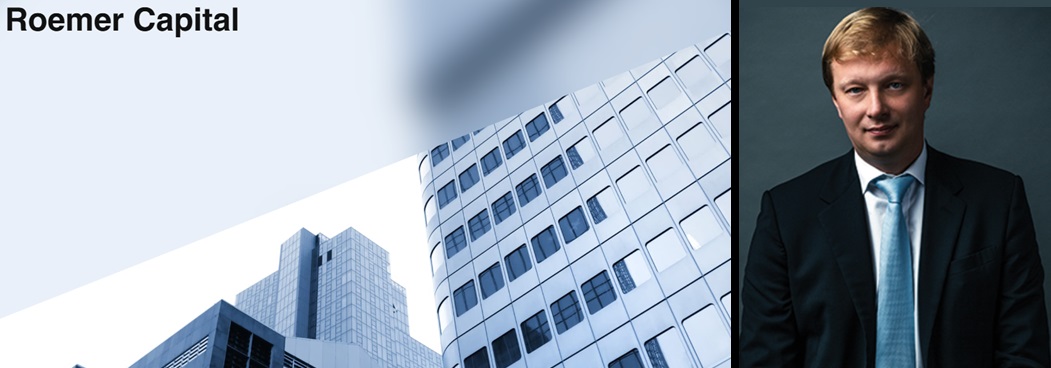Cyprus could rival Luxembourg and Ireland, says Roemer Capital's Roman Lokhov
Cyprus is uniquely positioned to develop a strong and competitive capital market, provided that the country approaches the privatisation of the Cyprus Stock Exchange (CSE) in a strategic and inclusive way, according to Roman Lokhov, chairman of Roemer Capital.
In an exclusive interview with the Cyprus Mail, Lokhov pointed out that Roemer Capital, a Cyprus-based boutique investment firm, has spent the past few years building a European infrastructure that connects developed and emerging markets.
“Theoretically, Cyprus could be in a position to establish a really strong capital market,” he said. “It could serve as a bridge between Europe, the Middle East and emerging economies, acting as a door into the European capital market.”
Lokhov, who previously led large international brokerage and asset management firms with operations in London, New York and Moscow, said that his company now views Cyprus as both a base and a growth market.
He stressed that Roemer Capital’s mission is not simply to trade or provide brokerage services, but to help create a fully functional financial ecosystem that attracts international investors.
“Our infrastructure is comparable to that of any major European investment bank,” he said. “We have strong relationships with custodians in New York, London and Dubai, but we want more of this infrastructure to exist here in Cyprus.”
He believes that Cyprus has the potential to compete with countries such as Luxembourg and Ireland, particularly if the country focuses on developing its capital markets through modernisation and better regulatory alignment.
“Cyprus could really compete with financial hubs like Luxembourg or Ireland,” he said. “It has the location, the talent and the regulatory framework as part of the European Union, but it needs to strengthen its capital markets infrastructure to reach that level.”
Turning to the subject of the Cyprus Stock Exchange, Lokhov said that its privatisation should not result in control by a single entity.
Instead, he advocates for a multi-stakeholder model that would include a combination of local and international investment banks, funds, brokerages and depository institutions, along with a continued government presence.
“If you want fast and sustainable development of the capital market, one stakeholder is not enough,” he said. “The stock exchange should not be sold entirely to one owner. There must be different players with skin in the game, who are genuinely interested in developing the market.”
He recalled his earlier experience on the board of the RTS Stock Exchange in Russia, which was owned by around 15 major players, including banks and brokerages. That structure, he said, encouraged competition and accountability.
“It is important to have players who are interested in development, not only in ownership,” he said. “When you have different participants with different strengths, you create an ecosystem where everyone drives the same goal.”
Lokhov expressed concern about the idea of selling the exchange entirely to another foreign stock exchange, saying that such a move could stifle local growth.
“When a stock exchange is sold to another exchange, sometimes not much changes,” he said. “It can become just another subsidiary, rather than a dynamic institution supporting the domestic market.”

He explained that Roemer Capital’s vision for the CSE involves transforming it into a regional platform for companies from emerging and frontier markets that wish to enter the European Union’s regulatory space.
“There are many strong and interesting enterprises in places like Africa, Kazakhstan, Saudi Arabia or Armenia,” he said. “As these companies grow, they need transparency and access to international investors, which is difficult to achieve in their home markets. Listing in the European Union would give them that opportunity, and Cyprus could be the gateway.”
He described Cyprus as geographically and strategically well placed to host such listings, connecting Europe with Africa and the Middle East.
“Cyprus could become a platform where companies from emerging regions are listed under European law,” he said. “This would attract investors who want transparency and security, and it would raise valuations for the companies themselves.”
He also said that the presence of a dynamic stock exchange would encourage the growth of related sectors such as depository services, market making, and institutional brokerage, areas he believes are currently underdeveloped in Cyprus.
“There are almost no depository services in Cyprus today,” he said. “Most institutions here operate with custodians abroad. One of the strategic goals should be to bring this business and infrastructure into the country.”
For the model to work, Lokhov said, all segments of the financial ecosystem must be involved. “You need investment banks to issue bonds and manage placements, institutional brokerages to provide liquidity, and retail brokers to expand market participation,” he said.
He added that the participation of local banks as investors or custodians would also be vital. “It would be good to have a Cypriot bank as a shareholder in the exchange, to bring conservative capital and ensure credibility,” he said.
According to Lokhov, Cyprus’ reputation has improved in recent years, but there is still work to be done to change perceptions among international financial institutions.
“Cyprus is part of the European Union, but some conservative banks in countries like Germany and France still hesitate to open accounts for Cypriot companies,” he said. “That is something that needs to change. The regulatory framework here is sound and improving, and the country deserves to be treated equally.”
He believes that institutions like Roemer Capital, with their focus on compliance and transparency, can help shift that perception. “We are regulated by CySEC, audited by PwC, and qualified as an intermediary with the IRS,” he said. “We are doing everything by the book, and we want to show that Cyprus is a serious and reliable jurisdiction.”
Beyond the stock exchange, Lokhov said that Cyprus should also adopt a long-term national strategy for developing its capital markets. He pointed to countries such as Saudi Arabia, which have articulated clear goals and timelines for financial sector development.
“For example, Saudi Arabia has Vision 2030, which sets out clear targets for becoming a financial hub,” he said. “Cyprus needs something similar. There should be a vision for 2035 that defines where the country wants to be in terms of capital markets, depository services, and investment banking.”
He emphasised that a coherent vision would help coordinate efforts between regulators, government agencies, and private companies.
“At the moment, there are good initiatives, but they are scattered,” he said. “There is no unified roadmap that says, this is where we want to go, and this is how we will get there.”
Lokhov also proposed the creation of an independent association of market participants to strengthen dialogue with the government and regulators.
“There should be an association of capital market participants, independent but recognised, that brings together brokers, banks, funds, and the stock exchange,” he said. “It should be a place where professionals discuss challenges and opportunities, and where the government listens.”
He argued that such a forum would help the authorities make informed decisions about regulatory reforms and market priorities.
“The government’s main support should be its commitment to listen,” he said. “When you have professional dialogue, you can build a sustainable market.”
Lokhov said that while Roemer Capital cannot transform the market alone, it aims to lead by example. The firm has already begun producing research on Cypriot and Greek banks, hosting investor roadshows, and facilitating trading in local equities for major institutional investors abroad.
“We recently executed a trade in Bank of Cyprus shares for one of the largest Italian funds,” he said. “It may sound small, but for a Cypriot investment firm to connect international institutional investors with local assets is a significant step.”
For Lokhov, such progress illustrates what is possible when Cyprus embraces its role as a bridge between Europe and emerging markets.
“Cyprus has a unique opportunity to build something remarkable,” he said. “It has the regulatory base, the geography, and the people. What it needs now is a shared vision and the courage to act on it.”






Click here to change your cookie preferences